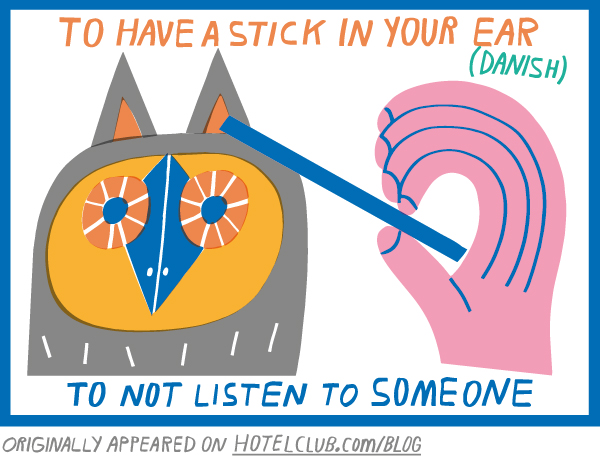10 Illustrated Idioms from Around the World Posted by Transparent Language on Nov 3, 2014 in Archived Posts
Guest Post by Matt Lindley, a language lover and digital content creator based in London. He’s visited many of Europe’s cultural gems and has lived in a few of them. When he isn’t jetting off somewhere, Matt enjoys learning Polish, riding his bike, listening to experimental music and playing synth in two bands.

Most times, we use idioms in our mother tongue without even knowing we’re using them. It’s not until we start learning a foreign language that we realise how odd and idiosyncratic they can be. Why do we “beat around the bush” while the Spanish “get the partridge drunk” and the Finns “pace around hot porridge like a cat”? It’s clear that idioms aren’t the same the world over – and for that we can be thankful.
Idioms give us a unique insight into the culture using them. They tell us what matters to a nation and give us a glimpse into the soul of its people. Who’d have thought Germans would have so many idioms about beer and sausages?
As a big fan of both foreign idioms and Marcus Oakley‘s drawings, I thought the pair would be a match made in heaven. So, I gave Marcus a big list of foreign idioms, after hours surfing the internet, talking to native speaker friends, and reading Jag Bhalla’s excellent book, I’m Not Hanging Noodles On Your Ears.
He came back with these colourful illustrations, featuring Spanish pumpkins, Russian hares and Portuguese donkeys. I hope you like them as much as I do and that they inspire you to learn the local idioms next time you travel. After all, beyond food, fashion and architecture, language is at the heart of all cultural differences.
Want to know more about the origins and meaning of these idioms? Read more at: http://www.hotelclub.com/blog/idioms-of-the-world-infographic/

Build vocabulary, practice pronunciation, and more with Transparent Language Online. Available anytime, anywhere, on any device.













Comments:
Lone:
To have a stick un your ear means to be drunk and NOT to not listen to somebody. I’m Danish and I’ve never heard of the expression mentioned above.
Israel:
@Lone That’s what I was going to point out before. Not a Danish, but I was reading the same thing in other discussions about this article with the same complaint.
bobh:
I have never heard your Finnish example. If it does exist it is clearly a calque from Swedish, where ‘groda’ (=frog) is often used to mean a linguistic faux pas.
Cecile Heatley:
About the idioms: I am French and I never heard that expression “avoir le demon de midi”.
It would have been nice to include the expressions in the original language as well as in English. I am surprised that only the English was shown.